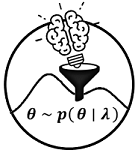# noqa SPDX-FileCopyrightText: 2024 Florence Bockting <florence.bockting@tu-dortmund.de>
#
# noqa SPDX-License-Identifier: Apache-2.0
[docs]
def save_history(
loss: bool = True,
loss_component: bool = True,
time: bool = True,
hyperparameter: bool = True,
hyperparameter_gradient: bool = True,
):
"""
Controls whether sub-results of the history object should be included
or excluded. Results are saved across epochs. By default all
sub-results are included.
Parameters
----------
loss : bool, optional
total loss per epoch. The default is True.
loss_component : bool, optional
loss per loss-component per epoch. The default is True.
time : bool, optional
time in sec per epoch. The default is True.
hyperparameter : bool, optional
'parametric_prior' method: Trainable hyperparameters of parametric
prior distributions.
'deep_prior' method: Mean and standard deviation of each marginal
from the joint prior.
The default is True.
hyperparameter_gradient : bool, optional
Gradients of the hyperparameter. Only for 'parametric_prior' method.
The default is True.
Returns
-------
save_hist_dict : dict
dictionary with inclusion/exclusion settings for each sub-result in
history object.
"""
save_hist_dict = dict(
loss=loss,
loss_component=loss_component,
hyperparameter=hyperparameter,
hyperparameter_gradient=hyperparameter_gradient,
)
return save_hist_dict
[docs]
def save_results(
target_quantities: bool = True,
elicited_statistics: bool = True,
prior_samples: bool = True,
model_samples: bool = True,
model: bool = True,
expert_elicited_statistics: bool = True,
expert_prior_samples: bool = True,
init_loss_list: bool = True,
init_prior: bool = True,
init_matrix: bool = True,
loss_tensor_expert: bool = True,
loss_tensor_model: bool = True,
):
"""
Controls whether sub-results of the result object should be included
or excluded in the final result file. Results are based on the
computation of the last epoch.
By default all sub-results are included.
Parameters
----------
target_quantities : bool, optional
simulation-based target quantities. The default is True.
elicited_statistics : bool, optional
simulation-based elicited statistics. The default is True.
prior_samples : bool, optional
samples from simulation-based prior distributions.
The default is True.
model_samples : bool, optional
output variables from the simulation-based generative model.
The default is True.
model : bool, optional
fitted elicit model object including the trainable variables.
The default is True.
expert_elicited_statistics : bool, optional
expert-elicited statistics. The default is True.
expert_prior_samples : bool, optional
if oracle is used: samples from the true prior distribution,
otherwise it is None. The default is True.
init_loss_list : bool, optional
initialization phase: Losses related to the samples drawn from the
initialization distribution.
Only included for method 'parametric_prior'.
The default is True.
init_prior : bool, optional
initialized elicit model object including the trainable variables.
Only included for method 'parametric_prior'.
The default is True.
init_matrix : bool, optional
initialization phase: samples drawn from the initialization
distribution for each hyperparameter.
Only included for method 'parametric_prior'.
The default is True.
loss_tensor_expert : bool, optional
expert term in loss component for computing the discrepancy.
The default is True.
loss_tensor_model : bool, optional
simulation-based term in loss component for computing the
discrepancy. The default is True.
Returns
-------
save_res_dict : dict
dictionary with inclusion/exclusion settings for each sub-result
in results object.
"""
save_res_dict = dict(
target_quantities=target_quantities,
elicited_statistics=elicited_statistics,
prior_samples=prior_samples,
model_samples=model_samples,
model=model,
expert_elicited_statistics=expert_elicited_statistics,
expert_prior_samples=expert_prior_samples,
init_loss_list=init_loss_list,
init_prior=init_prior,
init_matrix=init_matrix,
loss_tensor_expert=loss_tensor_expert,
loss_tensor_model=loss_tensor_model,
)
return save_res_dict

